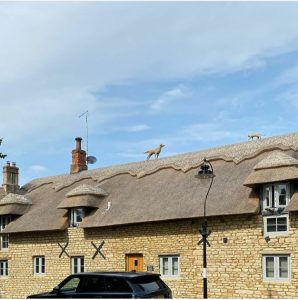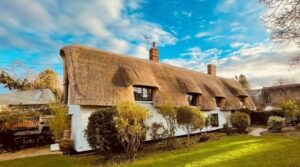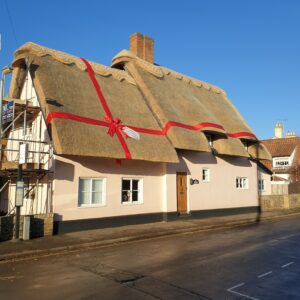Thatched roofs are a traditional roofing material made up of natural materials such as straw, reeds, and other plant-based materials. While they can add an authentic touch to any property, it is important to consider the potential dangers associated with them.
Fire Hazard
One of the biggest dangers associated with having a thatched roof is the risk of fire. Thatched roofs are highly combustible and can easily catch fire, which can spread quickly and cause devastating damage. The thatch is made up of dry, highly flammable materials such as straw, reeds, and other natural materials, which can easily ignite if exposed to heat or sparks.
It is important to note that even though modern fire retardant sprays can be used to make thatch more fire-resistant, they are not foolproof. These treatments will only delay the spread of a fire, giving the occupants of the property more time to evacuate.
If you want to learn more about handling the risks of fire and how to make your thatched roof fireproof, then make sure to check out our blog on the topic.
Pests and Rodent Infestation
Another significant hazard that comes with living in a thatched-roof house is the risk of rats and pests. Thatched roofs are a perfect home for rodents and pests, as the thatch provides a warm, dry environment that is perfect for nesting. As these pests move into the thatch, they can cause significant damage to the roof structure, insulation, and interior of the property.
Not only are rats and pests a nuisance to have in your home, but they can also carry diseases and pose a health risk to the occupants of the property. In addition, the damage that these pests can cause to the structure of the roof can make it more vulnerable to other hazards, such as leaks and collapses.
If you’d like to learn more about preventing rats from getting into your property, or how to get rid of rats from a thatched roof, then please check out our blog on the topic.
Water Damage
Another potential risk associated with thatched roofs is water damage. Thatched roofs are more susceptible to leaks than other types of roofs, which can cause water damage to the interior of the property. The thatch itself can also become waterlogged, which can cause it to become heavy and unstable, increasing the risk of collapse.
Thatched roofs require regular maintenance to keep them in good condition and to prevent water damage. This includes regular inspections, repairs, and re-thatching when necessary. Failure to maintain the roof can lead to serious water damage, which can be costly to repair and can pose a risk to the structural integrity of the property.
If you’d like to learn more about how to make your thatched roof waterproof then please check out our blog on the topic.
Mold and Mildew Growth
Because thatched roofs are made of organic materials, they are more susceptible to mold and mildew growth. If the roof becomes wet, it can create a damp environment that is perfect for mold and mildew to grow. Not only is mold and mildew unsightly and can cause a bad smell, but it can also pose a health risk to the occupants of the property, particularly those with respiratory issues.
Mold and mildew can be difficult to remove from thatched roofs, as the organic materials can absorb the spores and make it difficult to completely eliminate the problem. This can lead to ongoing health risks and damage to the property.


